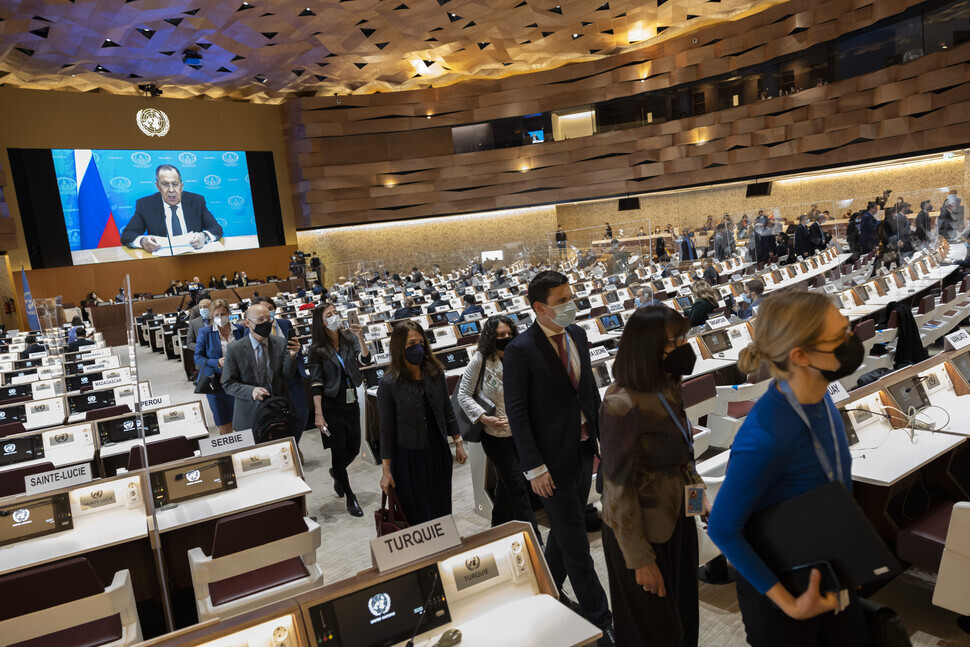hankyoreh
Links to other country sites 다른 나라 사이트 링크
[Column] The Ukraine war: Challenges for Europe and beyond


The Russian invasion of Ukraine came as a huge shock, if not a surprise. The European “peace order” is obviously in tatters, and the Ukrainian people are experiencing much loss of life and hardship. Ordinary people and their children, as always, are hit the hardest by the unprovoked war.
It seems that this war is being driven by Putin’s “nostalgia” rather than geopolitical “paranoia,” as previously widely assumed. There can be little doubt that the Ukrainian people rely on support from the West — the Russian aggressor is too powerful. But Western countries, and especially European ones, are undoubtedly struggling to come to terms with the Russian invasion and the new international order. Economic sanctions are central to the response of liberal democracies, as a means of pressuring Russia so as to change Putin’s economic calculus. Ukrainians, unsurprisingly, are calling for harder sanctions but some still are hesitant.
The war will hit the global economy, and economists around the world are revising their economic forecasts. Not only is Russia a major producer of gas and oil, but it also supplies the world with other key commodities such as wheat and industrial metals. Harder sanctions on the Putin regime will amplify the economic impact of the war, especially for European countries, which are more tightly integrated with the Russian economy. Their reliance on Russian gas is well documented, and this applies in particular to Germany, Europe’s economic engine.
Soaring energy prices are already a huge concern across the continent, and they are at the heart of accelerating inflation. The UK has recorded inflation of 5.5% — a rate not seen in three decades; and the Bank of England expects that the country will exceed 7% this spring. Things don’t look much different in Europe, and that’s before even factoring in the economic impact of the war in Ukraine, which will further drive up prices and suppress consumer confidence. There can be little doubt that the “cost of living crisis” will get worse before it gets better, and low-income households, as usual, will be hit the hardest.
That poses a huge dilemma for governments and their strategy toward Putin’s Russia. But more than that, it underscores that meaningful support for the Ukrainian people requires domestic social policy strategies too — not only to support social inclusion in the face of an economic crisis but also to maintain political support for an ambitious strategy in support of Ukrainians’ struggle for freedom.
There is a huge feeling of solidarity with the Ukrainian people — the world has turned blue and yellow, for the time being at least. But the war might last for a long time. We know too little about Putin’s intentions, but the Ukrainian people can be expected to defend their freedom with the greatest conviction. Their military will struggle to stand up to the Russian forces, but guerrilla warfare has been an effective strategy against Russian and other invasions.
Accordingly, economic sanctions against Russia might be with us for the foreseeable future, and we need to prepare for this. And of course, beyond short-term economic and social policy, liberal countries — not only in Europe but also elsewhere — need to reconsider their economic dependence on Russia and other autocratic countries. The Western belief that capitalism and economic integration promote democracy becomes ever more difficult to justify — not to mention the Chinese case. But that’s not all. The Russian invasion of Ukraine puts a spotlight on our vulnerability when relying on countries that are not prepared to play by the rules of the game. It is time to rethink our economic strategies more fundamentally, but the immediate challenge remains: the moral imperative to support Ukrainians in their struggle against the Russian aggressor.
Please direct questions or comments to [english@hani.co.kr]

Editorial・opinion
![[Column] Season 2 of special prosecutor probe may be coming to Korea soon [Column] Season 2 of special prosecutor probe may be coming to Korea soon](https://flexible.img.hani.co.kr/flexible/normal/500/300/imgdb/original/2024/0426/3317141030699447.jpg) [Column] Season 2 of special prosecutor probe may be coming to Korea soon
[Column] Season 2 of special prosecutor probe may be coming to Korea soon![[Column] Park Geun-hye déjà vu in Yoon Suk-yeol [Column] Park Geun-hye déjà vu in Yoon Suk-yeol](https://flexible.img.hani.co.kr/flexible/normal/500/300/imgdb/original/2024/0424/651713945113788.jpg) [Column] Park Geun-hye déjà vu in Yoon Suk-yeol
[Column] Park Geun-hye déjà vu in Yoon Suk-yeol- [Editorial] New weight of N. Korea’s nuclear threats makes dialogue all the more urgent
- [Guest essay] The real reason Korea’s new right wants to dub Rhee a founding father
- [Column] ‘Choson’: Is it time we start referring to N. Korea in its own terms?
- [Editorial] Japan’s rewriting of history with Korea has gone too far
- [Column] The president’s questionable capacity for dialogue
- [Column] Are chaebol firms just pizza pies for families to divvy up as they please?
- [Column] Has Korea, too, crossed the Rubicon on China?
- [Correspondent’s column] In Japan’s alliance with US, echoes of its past alliances with UK
Most viewed articles
- 1Is Japan about to snatch control of Line messenger from Korea’s Naver?
- 2‘We must say no’: Seoul defense chief on Korean, USFK involvement in hypothetical Taiwan crisis
- 3The dream K-drama boyfriend stealing hearts and screens in Japan
- 4[Editorial] Korea’s surprise Q1 growth requires objective assessment, not blind fanfare
- 5Division commander ordered troops to enter raging flood waters before Marine died, survivor says
- 6No good, very bad game for Korea puts it out of Olympics for first time since 1988
- 7S. Korea “monitoring developments” after report of secret Chinese police station in Seoul
- 8[Editorial] New weight of N. Korea’s nuclear threats makes dialogue all the more urgent
- 9[Reportage] On US campuses, student risk arrest as they call for divestment from Israel
- 10[Reporter’s notebook] To accept migrants isn’t enough — Korea must fight their exploitation